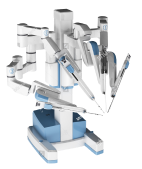Our Medical Experts
Max Healthcare is home to 5000 eminent doctors in the world, most of whom are pioneers in their respective fields. Additionally, they are renowned for developing innovative and revolutionary clinical procedures.
Find a DoctorDelhi/NCR:
Mohali:
Dehradun:
Bathinda:
Mumbai:
Nagpur:
Lucknow:
BRAIN ATTACK:

To Book an Appointment
Call Us+91 92688 80303At Max Healthcare, we are committed to deliver the highest standards of clinical excellence and that’s why we continuously invest in innovative technologies of the future to ensure our patients get the best care. Max Institute of Robotic Surgery is one of the largest robotic surgical programmes in India, which combines the advancements of robotic systems and the experience of specialists to make patient recovery easier and faster.
Max Institute of Robotic Surgery aims to deliver superior patient outcomes over conventional surgical approaches. Max Healthcare is equipped with 15 advanced surgical robotic systems including Da Vinci X, Da Vinci Xi, Next Gen Versius, ExcelsiusGPS and CORI surgical system. We have over 150 trained robotic surgeons in Max network hospitals, who have successfully performed numerous robotic surgeries.
Advantages of Robotic Surgeries over Conventional Surgeries:
Head & Neck cancer treatment is often associated with deterioration in speech, swallowing with associated facial or neck scars. Trans-Oral Robotic Surgery (TORS) is the latest and emerging technology which offers several advantages over other available treatment options.
It allows the surgeon to reach difficult to access areas in the throat or within the neck and remove the tumour through small robotic arms. These help in improving dexterity and precision. These can be placed inside through the mouth or through very small or inapparent incisions over the neck. TORS provide a broader view, high-resolution, and magnified three-dimensional optics for determining the specific mucosal surfaces of the head and neck through an endoscope while avoiding the extensive external neck incisions generally required for open surgeries. Compared to conventional surgeries, there is less pain, blood loss, reduced ICU stay and fewer days of hospitalization, which means a much faster recovery.
This technology can be used for selective cancers/tumours of the throat like tonsil, base of tongue, thyroid, parapharyngeal space and neck.
Robotic surgeries have made the management of complex urological malignancies easier, safer and more desirable to both the surgeon and the patient. Commonly performed surgeries in this field include robotic surgery for prostate cancer, partial or complete removal of kidney for kidney cancer, urinary bladder cancer, lymph nodes removal for testicular and penile cancer.
Robotics, in general surgeries, has proved to be a significant success because it has helped doctors overcome certain limitations they used to face while performing conventional procedures. Gallbladder stones, Hernia Surgery, Appendicitis, Fundoplication and other general surgeries can be robotically performed with ease.
Robotic surgery is performed to treat many types of gastrointestinal cancer, such as oesophagal cancer, gastric cancer, rectal cancer, and hepatopancreatobiliary cancer.
Robot-Assisted Kidney Transplant (RAKT) is a minimally invasive technique that uses robotic support to perform a kidney transplant. RAKT is performed under the supervision of transplant surgeons specialising in robotics and transplant surgeries.
Compared to conventional open kidney transplant surgery, a much smaller incision of about 7 cms is made in RAKT to place the donor kidney into the abdomen, stitch the blood vessels, and the ureter. Then, another four or five small incisions of size 0.5 to 1 cm approx. are used to insert the instruments into the abdomen.
The surgeon uses the computer to manipulate small, more flexible surgical instruments than the human hand.
End-stage liver disease and liver failures have become common around the globe, making liver transplants the only treatment modality. Compared with traditional open surgery, robotic liver transplant offers better treatment outcomes to both donor and recipient in terms of post-operative healing, pain and comfort.
Robotic liver surgery is not only employed in liver transplantation but is also useful in liver resection surgery, malignancy cases, and others. It is an evolving speciality within liver surgery. The robotic platform allows us to overcome the limitations of open and laparoscopic surgery.
Conventional, freehand, minimally invasive spine surgeries present many challenges. According to the literature, there are instances of misplaced pedicle screws in freehand surgery. In addition, these surgeries require high levels of radiation for intraoperative imaging to assure accuracy. The complex disorders that can be treated with robotic spinal surgeries include:
Robotic joint replacement surgeries have shown remarkable results compared to traditional knee replacements. Over a period of time, robotic knee surgery has evolved as a powerful and satisfactory tool for doctors. Doctors use a robotic surgical arm to accomplish parts of the procedure, assisting in areas that require the steadiest hand and navigating small places. Using CT scans, the robotic arm can work from 3D images of the surgical area and perform a range of tasks, such as:
Robotic bariatric surgery is a novel approach that is useful for people who wish to have sustained weight loss. This procedure is safe and effective, and doctors can perform both gastric bypass, sleeve gastrectomy & other weight loss procedures.
With this system, the surgeon sits at the console near the patient in the OT and controls tiny instruments used to perform the surgery. In addition, doctors can view through an optic camera, which delivers 3D high-definition views.
This Robotic system provides the surgeon 3-Dimensional magnified view of the operating field which increases the precision & accuracy of surgical movements of instruments.
Since the introduction of the latest robotic surgical systems to gynecologic surgery, it has been possible to perform minimally invasive procedures for many women who formerly needed open surgery.
Undoubtedly, conventional laparoscopic surgery has been beneficial, but robotic surgeries offer even better advantages, such as shorter hospitalization, less blood loss, faster recovery, better cosmesis and fewer to nil complications. In addition, robotic surgeries overcome the drawbacks of limited operative field visualization and the requirement for a skilled surgical assistant.
Some surgeries that are performed using robotic technology are:
Conventionally, open cardiac surgery requires sternotomy, i.e., cutting through the breastbone and accessing the ribs. This highly invasive technique can be avoided with robotic assistance. Robotic surgeries prevent trauma, reduce healing time and lower the risk of serious complications.
The robotic arms of the system operate via several small incisions. These incisions are termed ports, which are incised on the side of the chest. As a result, the surgeon can fully control the surgical procedure sitting in a console close to the operating room.
Robot-assisted cardiothoracic surgery can be employed for various conditions, such as:
Cardiac surgeries:
Thoracic & lung surgeries:
Robotic surgery has become very popular among adults and now gaining popularity for surgeries performed on children. Robotic surgery allows doctors to treat complex cases easily and offers better treatment outcomes and patient comfort. Pediatric Robotic Surgery requires special expertise since the surgery can be challenging in the paediatric population. This is due to their small size and different anatomic landmarks in comparison to adults. Robotic surgery is thus a boon for treating complex paediatric cases.
In children, robotic surgery can be applied to general surgery, thoracic surgery, urological, oncological, and otorhinolaryngology. Interestingly, its highest application has been in urology, but it also offers plenty of benefits in other fields. Furthermore, it is safe to perform robotic surgery in children since it has rare intra-operative and post-operative complications.
Gynecologic oncology surgeries, often referred to as "Gynae Onco Surgeries," are specialised surgical procedures focused on the diagnosis and treatment of cancers in the female reproductive system, including ovarian, cervical, uterine, vaginal, and vulvar cancers. These surgeries encompass a range of techniques, such as radical hysterectomy, lymphadenectomy, oophorectomy, and tumour debulking.
Robotic Gynae Onco Surgeries leverage advanced robotic systems to perform complex procedures with remarkable precision and minimally invasive techniques. The robotic platform offers several advantages, including enhanced visualisation with high-definition 3D imaging, improved dexterity through articulated robotic arms, and reduced invasiveness due to smaller incisions. This ensures shorter hospital stays, quicker recovery times, and reduced postoperative complications for patients.
Dr. Pradeep Chowbey - Chairman, Laparoscopic / Minimal Access Surgery, Robotic Surgery
Max Healthcare is home to 5000 eminent doctors in the world, most of whom are pioneers in their respective fields. Additionally, they are renowned for developing innovative and revolutionary clinical procedures.
Max Healthcare is home to 5000 eminent doctors in the world, most of whom are pioneers in their respective fields. Additionally, they are renowned for developing innovative and revolutionary clinical procedures.
Find a Doctor

Versius robot offers more flexibility, precision, and control for various surgeries such as Gallbladder Stones, Hernia, Appendicitis, Weight Loss (Bariatric) Surgery, Fundoplication and others
Learn MoreDa Vinci XI Robotics system is the next frontier for minimally invasive surgery. It provides a natural hand-eye positioning coordination plus the built in microphone facilitates efficient communication in operation theatre
Learn MoreRobotic Bilateral Knee Replacement Surgery
Treated by Dr. Simon Thomas, Max Super Speciality Hospital, Shalimar Bagh
Jun 6, 2024
Robotic Surgery for Prostate Cancer
Treated by Dr. Tushar Aditya Narain, Max Super Speciality Hospital, Saket
Apr 30, 2024
Robotic Partial Nephrectomy for Kidney Tumour
Treated by Dr. Harshit Garg, Max Super Speciality Hospital, Vaishali
Dec 22, 2023
Robotic Prostatectomy for Prostate Cancer
Treated by Dr. Tushar Aditya Narain, Max Smart Super Speciality Hospital, Saket
Oct 3, 2023
Deepak's Journey: Winning over Cancer with Positivity and Grit
Treated by Dr. Surender Kumar Dabas, Max Super Speciality Hospital, Shalimar Bagh
Jul 11, 2023
Robotic Prostatectomy Surgery for Prostate Cancer
Treated by Dr. Tushar Aditya Narain, Max Smart Super Speciality Hospital, Saket
Feb 22, 2023
Robotic Surgery for Dermoid Cyst
Treated by Dr. Jyoti Raina, Max Super Speciality Hospital, Dehradun
Feb 22, 2023
Robotic Knee Replacement Surgery for Knee Pain
Treated by Dr. Ramneek Mahajan, Max Smart Super Speciality Hospital, Saket
Jan 20, 2023
Robot-assisted Prostatectomy for Enlarged Prostate(Benign Prostatic Hyperplasia (BPH))
Treated by Dr. Waheedu Zzaman, Max Super Speciality Hospital, Shalimar Bagh
Jan 10, 2023
Robotic Hysterectomy Surgery for Cyst Removal
Treated by Dr. Parinita Kalita, Max Super Speciality Hospital, Patparganj
Jan 2, 2023
Robotic Bilateral Knee Replacement Surgery
Treated by Dr. Simon Thomas , Max Super Speciality Hospital, Shalimar Bagh